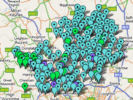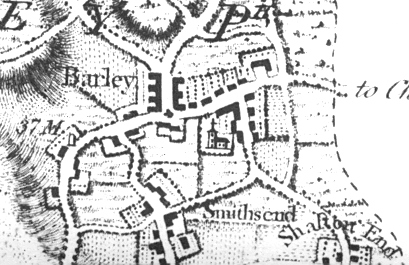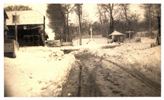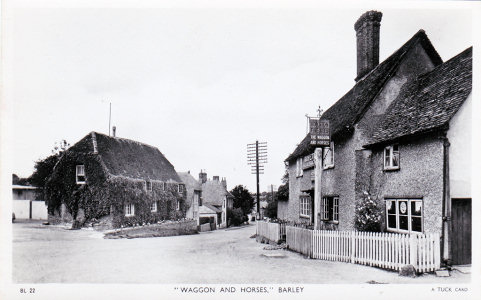Barley lies on what was a main road (the old Roman Ermine Street) to London. Not surprisingly the road through the town had plenty of facilities to cater for the passing traveller. Passing south along the Cambridge Road about 100 years ago you would first be greeted by Benjamin Bullen, of The Shah beer house (at the cross roads, top centre of the map).
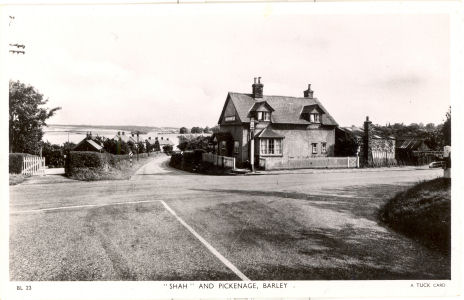 |
You might also see builders at work on the Arts and Crafts house, Dalny Veed, which was being built by Edgar Wood in 1907. |
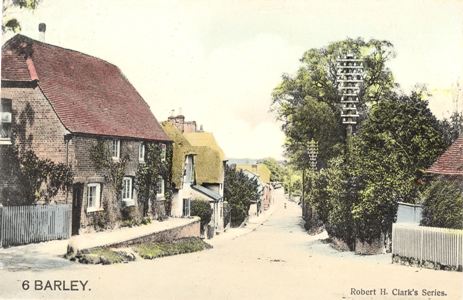 |
Entering the village proper you enter the High Street and drop down the hill to where your host will be Nathan Chapman, landlord of the King William IV beer house, which is next door to the village shop and post office. |
Continue down the road and you pass the house which had been occupied by Thomas Savell, who was a builder employing 36 men at the time of the 1851 census, which is a very large business for a village the size of Barley.
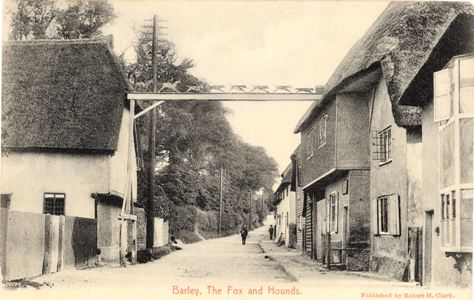 |
This may have been the public house called the Swan in 1670, but under the name The Fox and Hounds this thatched hostelry dominated the High Street until 1950, when it was destroyed by fire. |
The distinctive road sign crossing the road means that you would find it difficult to miss The Fox and Hounds Public House. Around 1901 the landlord was William Isles, but by 1908 he had been replaced by Alfred Stanley Oxley. |
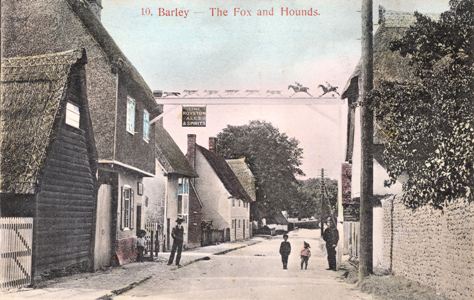 |
|
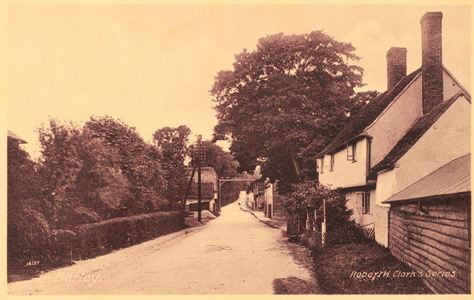 |
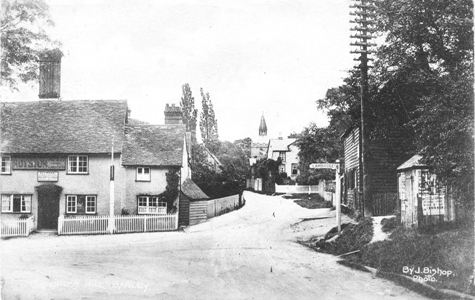
|
Cross Hill, Barley |
The public house at the southern end of the High Street is the Wagon and Horses, where you will be greeted by Albert Gooch (1901) or William George Saggs (1908). This had originally been a farm house but it was a public house with stables for 32 horses in 1797, when it was purchased by William Simmance (Hertfordshire Inns & Public Houses). In 1955 it was renamed The Fox and Hounds and a similar sign was put across the entrance to Church End.
At this junction you can look at the 17th century Cage and detour along Church End to see the Town House and St Margaret's Church. Turn south beyond the church and head for Shaftnoe End where William Chuck (1901) or John Dilley (1908) of the Three Crowns will provide nourishment before you return to the centre of the village.
The old Roman road would originally have gone straight ahead (south) but at the junction the road turns west to become London Road and you find William West looking for your custom at The Woolpack public house. If you still feel thirsty take a side road to Smith's End where Jacob Hayes of The Hoops beer house will be happy to oblige.
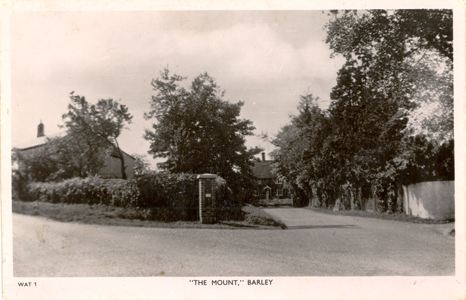 |
Message: I couldn't get one of Homestalls, the brothers lovely house, but the fence, etc. is their boundary. |
Further along London Road you reach The Mount where the road turns south. The Homestall, home of Redcliffe Nathan Salaman from 1906, is nearby. Henry (who became landlord in 1852 and continued until his death in 1905) or James Chuck of The Chequers will be happy to provide you with refreshment before you leave the village.
In 2008 there were only two public houses left. The Wagon & Horses is still there but now trading as The Fox and Hounds. The other survivor was The Chequers, which has been at its present site since 1811.
The publicans are taken from the 1901 census and the 1908 Kelly's directory. At the time of the 1891 census they were Stephen Chapman (Shah), Charles Smith (Fox & Hounds), Mary A Kimpton (Wagon and Horses), Thomas Allen (Woolpack), Henry Chuck (Chequers), William Chuck (Three Crowns), Sarah Chuck (Hoops). The King William IV was unoccupied.
The book Muster Books for North and East Hertfordshire contains a reference to William Barrett, who had an inn or ale house called The Bell at Barley in 1596.
